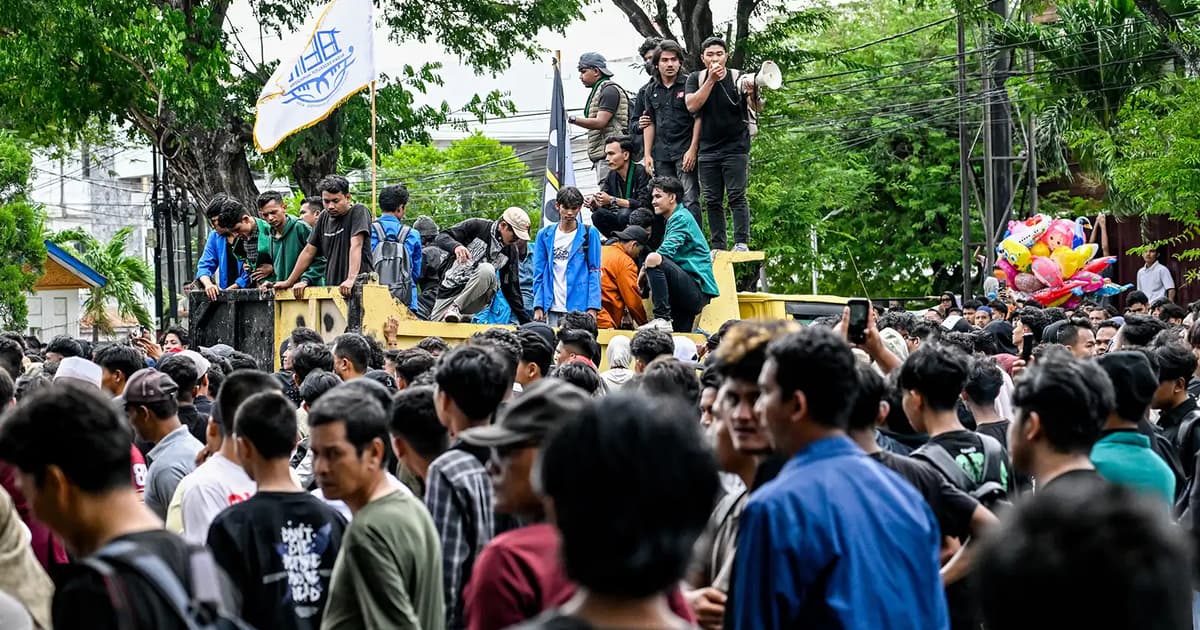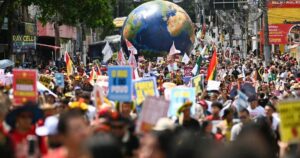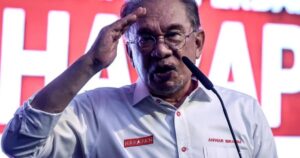
Young people unhappy with a government they deemed to have lost touch with their needs revolted in Nepal earlier this month. Similarly, towards the end of last month, young people in Indonesia took to the streets protesting a government they felt cared more for itself than its citizens.
Just over a year ago, in August 2024, young people in Bangladesh clashed with the police as they protested what they perceived as a government that was neglecting their needs and playing favourites.
Earlier still, in July 2022, tens of thousands of Sri Lankans protested the high cost of living, an economy that had collapsed, rife corruption and elites still living lavishly while the mass of citizens had no fuel for their vehicles and little food for their stomach.
Just as in Nepal, Indonesia and Bangladesh, here too what started off as peaceful protests spiralled into rampages of burning, looting, and brutal attacks on some ruling politicians and their homes.
While the governments in Sri Lanka, Bangladesh and Nepal collapsed, Indonesia’s President Prabowo Subianto managed to contain the situation – but barely.
President Gotabaya Rajapaksa of Sri Lanka fled to the Maldives, Bangladesh prime minister Sheikh Hasina fled to India while Nepal’s prime minister KP Sharma Oli went into hiding.
In Sri Lanka, protesters broke into and looted Rajapaksa’s residence, taking dips in his swimming pool. In Bangladesh, protesters ransacked Sheikh Hasina’s residence and later paraded some of the things they had taken, including her blouses and bras. In Nepal, protesters set fire to Oli’s house.
In Indonesia, protesters broke into and ransacked a house owned by finance minister Sri Mulyani Indrawati.
What can Malaysian leaders and politicians learn from what transpired in these nations?
In all four cases, the people were dissatisfied with their governments. In all four cases, long-standing grievances erupted following some incident or other.
In Sri Lanka, the spark was the extreme shortage of food and fuel due to mismanagement which had resulted in crop failure and the nation running out of foreign exchange to pay for imports and to service debt.
In Nepal, it was the total ban on 26 social media platforms, as I had written in my earlier column.
In Bangladesh, the spark was a jobs reservation system in the civil service favouring descendants of those who had participated in Bangladesh’s independence movement of 1971, when the former East Pakistan separated from West Pakistan in a bloody war.
Young Bangladeshis, especially students, felt deprived of a chance to enter the civil service, given the already limited job opportunities in the country.
In Indonesia, the spark was news of a hike in allowances for parliamentarians which was exacerbated when a food delivery rider was struck down and run over by a police armoured vehicle deployed to disperse protesters on Aug 28.
In all these cases, there were similar underlying factors at play. Protesters in all four countries decried what they saw as autocratic and corrupt governments which prioritised the rich, powerful and connected at the expense of ordinary citizens.
For instance, in Nepal, the hashtag #NepoKids became shorthand for the system of nepotism, cronyism and special privileges enjoyed by the elite. Frustrated ordinary netizens shared pictures of politicians and their family members flaunting their lavish lifestyles on social media while ordinary Nepalis struggled. Protesters say this was the reason for the clampdown on the 26 social media platforms.
In all four countries, hardship due to rising cost of living or failed economic policies, corruption, cronyism and policies seen as favouring the elites were the major underlying causes. Importantly, the protests were also against what was perceived as police overreach and brutality.
What is clear from all the above protests and turmoil is that citizens of these nations see or saw their government as being insensitive to their needs and not putting them front and centre of their policies and actions. They were unhappy with the elites enriching themselves and their children or their cronies while the ordinary citizen was deprived of equal opportunities at achieving a reasonable standard of living, not to mention having food on the table.
Our own politicians would be aware that Malaysians have many similar complaints, except that these are somewhat muted because our situation has not reached the scale that it did in the four other countries.
Almost everyone agrees there is systemic corruption here. Although there is dissatisfaction that some connected people seem to get away with a discharge not amounting to an acquittal or paying compensation after being charged with money laundering, generally, the public can see that the Malaysian Anti-Corruption Commission (MACC) is producing the corrupt in court.
But, having said that, I have to note that accusations of selective prosecution have been levelled at the MACC and the attorney-general.
Also, although the cost of living is going up, the economy is generally doing well and the government is taking some measures to ease the poor’s suffering – such as through cash handouts. Whether, say, a RM100 one-off cash handout helps or not, it tells everyone above 18 that the government cares enough to make that amount available to them.
The government needs to ramp up its war on graft, especially against politicians – regardless of whether they are in the ruling party or not. Good governance matters too, and the government must show that this is being practised.
The government also needs to keep inflation under control and ensure that wages meet the rising cost of living.
People will give the thumbs up if government leaders, politicians and top civil servants don’t favour family members or cronies or party members in the giving of contracts, land or trade licences.
Government policies must ensure that every citizen – regardless of race and religion – gets an equal opportunity to progress and live well. This, I believe, will be uppermost in the minds of citizens as we celebrate Malaysia Day on Sept 16.
Also, the government would do well to first seek out the views of the public before passing any new law or implementing any new rule. Greater engagement will give the government a better idea of what the public wants.
And if it intends to ban something or other, it should take a cue from China which, in curbing dissent, restricted Western platforms and sites but allowed domestic alternatives, such as WeChat, to continue.
Certainly, young people today are not as docile as those who came before them. They crave greater freedom, and if their freedom is trampled upon, they are less likely to accept it. They are also less likely to accept governments that mismanage the economy or governments that favour the elites.
So, it would be good for the government to allow greater freedom of expression and assembly.
At the same time, the police have to be very careful how they handle protesters. The consequences of using brute force are clearly evident in Nepal, Bangladesh, and elsewhere.
Certainly the police should go after trouble makers and those who threaten public peace and order, but if citizens just want to voice their dissatisfaction and protest peacefully, such protests should be facilitated.
Having seen what happened to their counterparts in these four nations, leaders and politicians here, I believe, would be more careful not to flaunt their wealth or get entangled in corrupt practices or abuse their powers or treat ordinary people as inconsequential.
I’m sure they will find many more lessons in these tragic incidents where lives were lost and property destroyed. Provided, of course, they pause to reflect. And provided, of course, they don’t forget it after a month or two.
Read also: Lessons from Nepal for Malaysians
The views expressed are those of the writer and do not necessarily reflect those of FMT.






